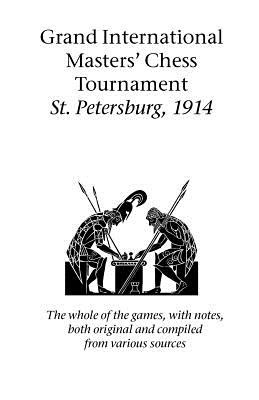
- We will send in 10–14 business days.
- Publisher: Hardinge Simpole Limited
- Year: 2005
- Pages: 80
- ISBN-10: 1843821621
- ISBN-13: 9781843821625
- Format: 14 x 21.6 x 0.5 cm, minkšti viršeliai
- Language: English
- SAVE -10% with code: EXTRA
Grand International Masters' Chess Tournament St. Petersburg, 1914 (e-book) (used book) | bookbook.eu
Reviews
Description
The St. Petersburg Grand International Masters' Tournament of 1914 was undoubtedly the most important tournament since the first San Sebastian Tournament, when Capablanca won his spurs, or, as some will have it, since the St. Petersburg Quadrangular Tournament of 1895. It would be noteworthy even if for no other reason than that the World's Champion, Dr. Emanuel Lasker, took part - the first occasion since the last International Tournament in St. Petersburg in 1909. On that occasion, however he tied for the first place with Akuba K. Rubinstein instead of winning outright, as on this occasion and in 1895. It is a remarkable circumstance that this time Rubinstein did not even attain so high as fifth place, which would have enabled him to play in the second section for the allocation of the prizes, the more extraordinary in view of his almost unbroken success of late years. The St. Petersburg Chess Society was responsible for the initiation, organization, and conduct of the Tournament, the Tsar himself subscribing 1,000 roubles towards the prize fund. With notes by Lasker, Burn, Gunsberg, Yates and other prominent analysts of the day
EXTRA 10 % discount with code: EXTRA
The promotion ends in 23d.00:44:42
The discount code is valid when purchasing from 10 €. Discounts do not stack.
- Publisher: Hardinge Simpole Limited
- Year: 2005
- Pages: 80
- ISBN-10: 1843821621
- ISBN-13: 9781843821625
- Format: 14 x 21.6 x 0.5 cm, minkšti viršeliai
- Language: English English
The St. Petersburg Grand International Masters' Tournament of 1914 was undoubtedly the most important tournament since the first San Sebastian Tournament, when Capablanca won his spurs, or, as some will have it, since the St. Petersburg Quadrangular Tournament of 1895. It would be noteworthy even if for no other reason than that the World's Champion, Dr. Emanuel Lasker, took part - the first occasion since the last International Tournament in St. Petersburg in 1909. On that occasion, however he tied for the first place with Akuba K. Rubinstein instead of winning outright, as on this occasion and in 1895. It is a remarkable circumstance that this time Rubinstein did not even attain so high as fifth place, which would have enabled him to play in the second section for the allocation of the prizes, the more extraordinary in view of his almost unbroken success of late years. The St. Petersburg Chess Society was responsible for the initiation, organization, and conduct of the Tournament, the Tsar himself subscribing 1,000 roubles towards the prize fund. With notes by Lasker, Burn, Gunsberg, Yates and other prominent analysts of the day


Reviews